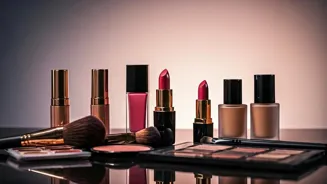The Perfume Dilemma
The article kicks off with a witty nod to Lady Macbeth's famous quote, setting the stage for a playful yet critical examination of makeup. The author uses
the analogy of washing hands with perfume to highlight the potential absurdity of excessive consumption. The narrative then playfully touches on the author's personal experiences with an overwhelming collection of beauty products, particularly nail polish and lipsticks, drawing a parallel between the sheer volume of items and the societal expectations often associated with them. The humorous tone invites readers to reflect on their own relationships with makeup and the motivations behind their choices.
Makeup Mania Unveiled
The author humorously recounts the extent of her makeup collection, including the copious amount of nail polish and the number of lipsticks and eyeliners. These details highlight the author's realization that the more makeup she owns, the more she seems to believe she will be considered beautiful. This is a satirical comment on advertising's impact on our self-perception and the pursuit of beauty standards. This section shows how easily people can fall into the trap of acquiring products in the belief that they will enhance their appearance or social standing. It underlines the idea that the desire for beauty often originates from external influences.
Battling the Urge
The narrative shifts to address the internal conflict that comes with the makeup obsession. The author jokingly considers therapy, but ultimately accepts her addiction, suggesting that it's the least of her worries. The final line, "beauty is in the eyes of the billholder," encapsulates the core theme, implying that the concept of beauty is often influenced by financial factors and the beauty industry itself. This section provides a broader understanding of societal pressures and how they affect individual self-perception. The author makes the conclusion that beauty is not necessarily about physical appearance but about the spending habits of individuals.














